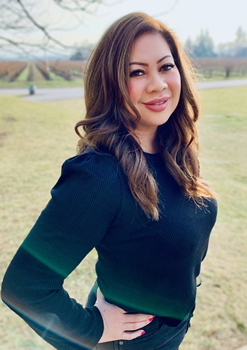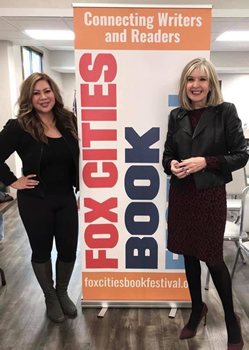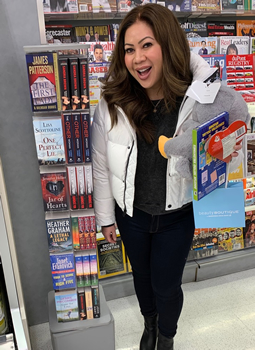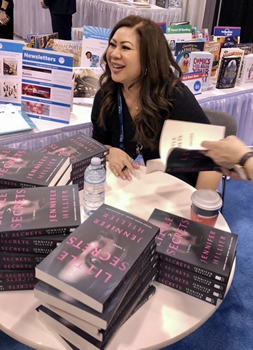Navigating Change—One Book at a Time
Since her debut novel, Creep, hit shelves in 2011, Jennifer Hillier’s career has undergone a number of remarkable transformations. Though the lifelong Stephen King devotee initially set out to write horror novels, she quickly realized that psychological thrillers were her true calling—she churned out three well-received novels and amassed a cult following before hitting a speed bump when her fourth published thriller, 2015’s Wonderland, was given a digital-only release by her first publisher. (More on that later.) After switching to a different house, Hillier came back stronger than ever with 2018’s Jar of Hearts, which introduced her to a wider readership, earned last year’s Thriller Award for Best Hardcover, and was shortlisted for the Anthony and Macavity Awards for Best Novel.
Hillier stands to reinvent herself once again with this month’s LITTLE SECRETS, which finds her stepping away from her trademark serial killer narratives in favor of a domestic suspense tale about a woman who takes desperate measures to save what’s left of her family. When the novel opens, Marin Machado is thrust into every parent’s worst nightmare: her four-year-old son, Sebastian, is lured away without a trace by an unknown abductor at Seattle’s Pike Place Market. Fifteen months later, Marin, still mired in grief and despair, hires a private investigator to pick up her son’s trail where the police left off. But instead of finding Sebastian, the detective finds Kenzie Li, a 24-year-old artist who’s having an affair with Marin’s husband, Derek. Unwilling to let the final threads of her life unravel, Marin devises a plan to end the relationship between Derek and Kenzie—once and for all.
On the eve of her new thriller’s release, Hillier set aside some time to talk with The Big Thrill about the evolution of her career from would-be horror writer to award-winning thriller author; the debate about unlikeable female characters; and weathering the trials of publishing, only to come out stronger on the other side.
LITTLE SECRETS marks new territory for you, both in terms of subject matter and genre. What was the genesis of the story?
What I thought the book was going to be about isn’t how it turned out. When I pitched it to my editor almost two years ago, it was a completely different story. It was really just about cheating. I pictured a woman discovering that her husband was having an affair with a much younger woman and hiring someone to kill [the younger woman] in a fit of rage.

But then I realized there was so much more going on. I think when a marriage deteriorates to the point where one spouse is cheating, there’s a lot of things that led up to that and I wanted to dig into what those things might have been. And as I began to dig in, I realized, oh, they have a child. But where is he? He’s not around anymore. Why isn’t he around? What happened to him? And then it morphed into a story that opens with [the main character’s] son getting kidnapped, and then she spirals into this dark place, I think as any mother would. And then getting to the point where the marriage is kind of hanging by a thread and they’re dealing with their grief in very different ways. Marin is self-harming, drinking a lot and taking pills, and Derek is cheating. I wanted to explore that. The story turned out to be so different, and I remember when I sent it back [to my editor] I was apologizing. And my editor was like, “Oh my God, this is not what we talked about.” He was really understanding, but it was like I’d maybe forgotten to mention that I’d shifted gears.
This book is a pretty big shift for you, from serial killer thrillers to domestic suspense. Did it feel different as you were writing it?
It so felt different. It wasn’t something that I consciously did. I just remember getting to a point in the middle of the book where it was hard to keep it moving forward because, historically, I’ve written serial killer books. And I love that genre and I still consider myself a serial killer thriller writer, but with serial killer books, you have victims, and when I get stuck on a story I can always kill somebody. New dead body, new set of clues, the story keeps moving forward. But in LITTLE SECRETS, there are really no dead bodies—there’s no serial killer prowling the city and clues popping up. So how do you keep it going? It was harder than I thought, so kudos to everybody who doesn’t kill people in their books.

Let’s talk about the characters for a minute. You focus exclusively on Marin and Kenzie—Derek is a big presence, but the heart of the book is really the two women. Can you talk about how they came into focus for you?
I saw both women really clearly, but Marin’s voice was more natural for me because she’s my age. She’s been with Derek for 20 years, since college—I was married before my current husband, and we were together since high school. So I could relate to some of the things she was thinking and feeling. I’ve had fertility struggles too, so I could relate to some of the stuff that she had to go through to have Sebastian. But then I also could remember what it was like to be in my 20s and not knowing who I was or what I wanted to do—being creative but not sure how to make money from that, and imagining what it would be like to be that version of myself, but in today’s world. Back when I was 24 there was no Instagram, there was no Facebook. What would those pressures have been if I were 24 today? How would I handle my life differently? How would I make money? And I didn’t want to necessarily villainize either woman. I didn’t want to make Marin seem like this awful person for wanting her husband’s lover dead, but I also didn’t want to make Kenzie seem like this awful person for having sex with a married man. They’re flawed and complicated, as women are, right? I wanted to just dive into their world and see things how they see things. Nothing is ever black and white. I think that’s the fun of a psych suspense—there’s so many layers and complexities to how people behave.
Do you write purely to entertain, or is there something larger that you hope readers will take from something like LITTLE SECRETS?
I am unabashedly writing to entertain. If you tell me that my book was your vacation read, that’s a compliment, man. But I’m trying to work on my craft. I’m always trying to write a better book. Is there a better way I can say something? I care about the prose a lot. Whether the reader notices that doesn’t matter as much, because I know that, in a thriller, pacing is everything, story is everything. And I respect that, because those are the rules of being a commercial fiction writer. But I try to personally get better with every book.

One of the many things you’re great at is the plot twist that surprises without cheating—you always play fair with your readers. What’s the secret to creating a twist that does both of those things?
If I were an outliner, I think I would have a really good answer. But because I’m not, I don’t know the twist until I write it, which happens very late in the manuscript. Like for LITTLE SECRETS, I had fun with that ending. I had 80,000 words down, the novel should be wrapping up, and I didn’t know who the villain was. I didn’t know who had taken Sebastian, even at 80,000 words. I had such a hard time finishing the book because every time I would go down a path, I would second-guess myself. I never do this because I’m not good at asking for help—I’m working on that, because it doesn’t serve anybody—but I finally called my agent, whom I never use [for editorial advice]. She’s so open to helping and giving creative advice, but I’ve never used her for that. But I finally called her and I said, “I am so stuck,” and she said, “What do you have so far?” And I told her what the book was about and I gave her my possible endings, and she told me that, as long as you write it well and to the best of your ability, you can sell anything. And it was like, “Oh yeah, that’s right—it’s up to me. [Laughs] It’s my story and I get to choose, and it’s really okay.”
In your “How It Happened” piece for The Thrill Begins, you recount an instructive story about the pitfalls of trying to make a protagonist likeable. I’m wondering how that lesson resonated while you were writing LITTLE SECRETS.
When I got feedback about unlikeable characters in the very beginning—when I workshopped Creep, my first book, which starred a sex-addict psychology professor—I realized a lot of the unlikeable-woman thing came from men. There were a lot of men who didn’t like unlikeable women. I wasn’t hearing that feedback consistently from women—I was hearing it consistently from men. But I didn’t put that together, honestly, until recently. I write books to entertain, but I picture my audience as primarily female—as I’m writing, I’m imagining what people like me are going to think about it, because I’ve been reading thrillers and psychological suspense for so long. I don’t think we mind if they’re unlikeable. I don’t think that needs to be a thing. I think what we care about is, are they interesting? Are they complex? Are they relatable? I don’t think likeable matters. I think that’s a really personal judgment call, whether you like someone or not.
Not worrying about it has been really freeing. Not worrying about whether my characters are liked opens up the door to do everything I’ve ever wanted to do as a writer. I wish I could inject that into my personal life and not worry so much about being liked as a person, because I think that would also be freeing. In fiction, it’s a way to explore who we really are without worrying about what people think. And so I’m glad I learned that lesson early, because every single book I’ve written since then has featured unlikeable women.

What changed for you between Wonderland and Jar of Hearts?
Wonderland was such a hard book to write. I was three months pregnant when I started it, and then I wrote it during the first six months of my son’s life. So that spanned a year of being pregnant and then being a new mom. I’d had a great run with Gallery and Simon & Schuster. But Wonderland felt forced for me, and I didn’t like the way that felt. It was a lot of me trying to prove to myself that I could be a mom and still write. And it would’ve been completely okay in hindsight to take a year off, but at the time I was paranoid about losing whatever I’d already gained, of being forgotten. So I really kind of forced myself to write that book.
At the time, [the publisher] thought of it as something that would have a smaller audience, and so the decision was made to only release it as an e-book, which was a change for me because the first three had come out in hardcover. For a lot of reasons, I said yes to an offer that I wasn’t entirely comfortable with. But, that experience totally taught me how to fight for what I want. It taught me how to write the stories that I wanted to write, and it taught me that it’s okay to pass on [a deal] that doesn’t feel good. And honestly, if I hadn’t gone through the whole Wonderland thing—and I love that book; I’m still really proud of it—I think that I would never have been able to write Jar of Hearts. It was like, I wrote this book, and it may very well have killed my career, so I’m gonna write this next book and take one last shot at it, and I’m gonna give it everything I’ve got—I’ve got nothing to lose. I was reading this interview with M. Night Shyamalan where he talked about failure, because he’s had gigantic successes and then horrible box office failures, and he said there’s so much freedom in failing, because when you fail, you’ve got nothing to lose. Nobody’s watching. You can do what you want. And that’s exactly what it felt like after Wonderland. No one was banging on my door asking me what I’ve got coming out next. I might as well just sit and write the book I really, really want to write, and that’s where Jar of Hearts came from.
So I don’t regret it, but if I were giving another writer advice, I would advise them differently than I advised myself, if that makes sense. Your sales record really does matter to retailers, and I would’ve done something different if I’d thought it through. But you don’t know what you know until you know, and all of my best lessons have come from my biggest failures.
On your website, you talk about the realization early on that you’re not a horror writer—you’re a thriller writer. I’m wondering how that realization affected your writing.

I was so dismayed to realize that I wasn’t a horror writer! I grew up, as we all did, reading Stephen King. I love horror movies, and I was certain I was a horror writer. My first book that I wrote was a haunted-house madman type of story, where this man lived in a neighborhood, he was a creepy dude, he was evil, and it had a bit of paranormal stuff thrown in. It was really a horror story. It was so hard to write, and I realized that to write horror well, you need a serious talent for making your characters completely believable. I think that’s the magic of Stephen King—you believe in his characters so much, he writes them so well, that you will believe anything that happens to them. I don’t know that that’s necessarily my strength as a writer, where I can make you believe in this one character so much, and relate to him or her so much, that you will believe there’s a ghost in the house. It’s a talent I don’t think I have, and it really is a talent.
So I wrote this book and it felt really forced, and it was terrible. I made every clichéd mistake you could make. I put it away because I knew it was terrible, but I was proud that I’d finished it. So that went in the drawer—that was my trunk novel. And then I wrote Creep, and as I was writing that book, I found myself writing about a serial killer, and that felt right. So it was like, okay, I can still have the element of being scary and thrilling, but I can write this more believably than I can a horror. I can sell you on this, on the fear of real-life danger. It was just a better fit for me, and as soon as I began to write it, I was like, “Oh my God, I think I’m a thriller writer.” It was a surprise to discover that I wasn’t a horror writer.
Finally, since it’s almost time to announce the finalists in this year’s Thriller Awards, can you talk a bit about your win for Jar of Hearts in last year’s Best Hardcover category?
It was wonderful to win that award last July. Here’s what’s funny: because I’m such a commercial writer, I’ve never thought about awards much. Every awards season, when the nominations come out, I’m thrilled for all the names that I see. I’m a big fan of everybody. But I’ve never put myself in a place where I thought, this might be something that I could be recognized for. I just felt like those books were on a higher level than mine. And so the Thriller Award nomination was the first award nomination I ever received, and I was so emotional the day that I saw the email. And I didn’t actually see the email at first because it went into my junk folder. I subscribe [to the ITW newsletter]—I get all the updates—but for whatever reason, this one email went into my spam folder, so I didn’t see it, but my phone instantly blew up.
It meant so much more than I ever allowed myself to think that it would. And when I won, which I didn’t think was a possibility at all, it was so emotional. It really was the highlight of everything that I’ve worked for, because I love ThrillerFest, I love ITW. ThrillerFest is the one conference I try to go to every year. I’ve been eight times in 10 years. And so it was really magical to get up on that stage and say thank you. It was special, and I’m so grateful that it happened.

